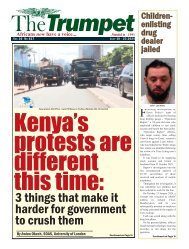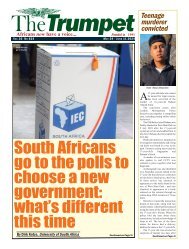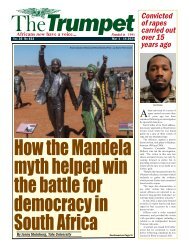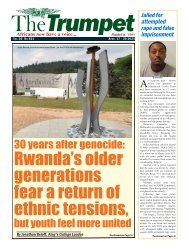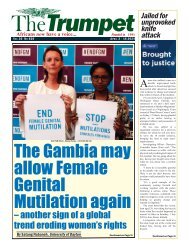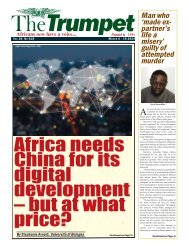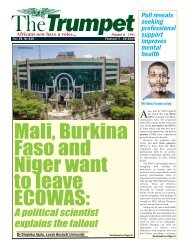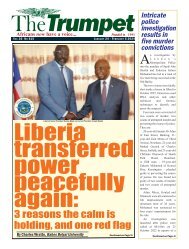The Trumpet Newspaper Issue 564 (February 9 - 22 2022)
Burundi's vicious crackdown never ended
Burundi's vicious crackdown never ended
Create successful ePaper yourself
Turn your PDF publications into a flip-book with our unique Google optimized e-Paper software.
News<br />
FEBRUARY 9-<strong>22</strong> 20<strong>22</strong><br />
Burundi’s vicious crackdown<br />
never ended<br />
<strong>The</strong><strong>Trumpet</strong><br />
Page11<br />
Continued from Page 3<<br />
and President Évariste Ndayishimiye’s<br />
pursuit of reforms across multiple<br />
sectors.” In October, the EU indicated<br />
that even as it renewed targeted sanctions<br />
against some senior Burundian officials,<br />
it would also resume direct budgetary<br />
support to Burundi’s government.<br />
<strong>The</strong>se overtures toward a government<br />
that continues to torture and kill its own<br />
people risk emboldening Burundi’s<br />
leaders to crack down even harder on<br />
their opponents. Instead of hoping that<br />
the Burundian government will change<br />
its ways, the United States and the<br />
European Union should publicly push the<br />
country’s leaders to take concrete and<br />
measurable steps to improve their dire<br />
human rights record.<br />
False promises<br />
Burundi descended into chaos and<br />
violence in April 2015, after Nkurunziza<br />
announced a controversial bid for a third<br />
term in office, sparking months of<br />
protests and a failed coup attempt.<br />
Government security forces and members<br />
of the ruling party’s youth league, known<br />
as the Imbonerakure - meaning “those<br />
who see far” in the Kirundi language -<br />
arrested or shot protesters and critics. By<br />
mid-2015, hundreds of people had been<br />
killed, and almost all of Burundi’s<br />
opposition leaders, independent<br />
journalists, and civil society activists had<br />
fled the country. Some 400,000 people<br />
sought refuge in neighboring countries.<br />
In 2018, Nkurunziza unexpectedly<br />
announced that he would not seek<br />
reelection in 2020. Ndayishimiye, a<br />
former army general who was Secretary-<br />
General of the ruling party at the height<br />
of the crisis, became the party’s candidate<br />
for president, winning in an election<br />
marred by violence and allegations of<br />
rigging. In June 2020, two months before<br />
he was set to step down, Nkurunziza died<br />
suddenly under mysterious<br />
circumstances.<br />
Ndayishimiye was sworn in early<br />
during a hastily arranged ceremony.<br />
Although he had overseen the party while<br />
it committed grave human rights abuses,<br />
Ndayishimiye promised to promote<br />
political tolerance, make the justice<br />
system more impartial and fair, and hold<br />
accountable those responsible for past<br />
crimes.<br />
Ndayishimiye did release some<br />
human rights advocates and journalists<br />
from jail and lift some restrictions on the<br />
media and civil society, but his<br />
government continues to use repressive<br />
tactics against its opponents. Tony<br />
Germain Nkina, a lawyer and former<br />
human rights defender, was convicted on<br />
baseless charges of collaborating with<br />
rebels that were confirmed on appeal in<br />
September 2021. <strong>The</strong> government has<br />
also used arrest warrants, convictions in<br />
absentia, and life sentences against<br />
human rights defenders in exile to silence<br />
the country’s once-thriving human rights<br />
movement.<br />
“Our province has become a<br />
graveyard.”<br />
<strong>The</strong>n there are the killings. Carried<br />
out by security forces, Imbonerakure<br />
members, and other unknown<br />
perpetrators, they have sowed terror<br />
among the population. “Our province has<br />
become a graveyard,” one resident of<br />
Cibitoke told my colleagues and me last<br />
August. Another man said he witnessed<br />
four men in military attire beat to death<br />
Emmanuel Baransegeta, a 53-year-old<br />
fisherman, as he returned from work on<br />
the Rusizi River the evening of July 8,<br />
2021. Two days later on the banks of the<br />
river, residents found the body of a man<br />
who looked as if he had been beaten.<br />
<strong>The</strong>y said they believed he was<br />
Baransegeta, but the local authorities<br />
buried him without investigating the<br />
circumstances of his death or even trying<br />
to confirm his identity.<br />
For many, these killings evoke<br />
memories of Burundi’s violent past. <strong>The</strong><br />
banks of the Rusizi have historically been<br />
dumping grounds for bodies of people<br />
killed in political or ethnic strife. During<br />
Burundi’s brutal civil war, which raged<br />
from 1993 to 2009, an estimated 300,000<br />
people were killed in fighting that broke<br />
down largely along ethnic lines. Both the<br />
Tutsi-dominated military and the armed<br />
Hutu opposition forces committed<br />
serious war crimes, including killings and<br />
President Évariste Ndayishimiy<br />
rapes of civilians.<br />
Nkurunziza’s first term, from 2005 to<br />
2010, offered hope for a break with that<br />
history. A Hutu rebel leader during the<br />
war, he took office under a new<br />
constitution that guaranteed powersharing<br />
between Hutus and Tutsis and<br />
among political parties. Despite<br />
continued bouts of violence, the country<br />
achieved a degree of stability and made<br />
some progress toward peace,<br />
reconciliation, and economic<br />
development. It developed a burgeoning<br />
civil society and independent media<br />
landscape. But this fragile progress<br />
suffered serious setbacks during and after<br />
the 2010 elections as political tensions<br />
rose and security forces and armed<br />
opposition groups committed scores of<br />
killings. In Cibitoke, residents once again<br />
found mutilated bodies of opposition<br />
supporters near the river. Now, they are<br />
encountering them with appalling<br />
frequency.<br />
Dangerous gamble<br />
In September 2021, the UN<br />
Commission of Inquiry on Burundi,<br />
which has documented grave human<br />
rights violations in the country every year<br />
since its creation in 2016, presented its<br />
last report to the UN Human Rights<br />
Council. <strong>The</strong> Commission concluded that<br />
under Burundi’s new government, “no<br />
structural reform has been undertaken to<br />
durably improve the situation.” It<br />
expressed alarm about continuing human<br />
rights violations and the progressive<br />
erosion of the rule of law. Yet the Human<br />
Rights Council, in a resolution led by the<br />
EU and supported by the United States,<br />
ended the Commission’s mandate in<br />
favor of a Special Rapporteur with fewer<br />
resources to investigate human rights<br />
violations. <strong>The</strong> resolution claimed that<br />
progress “has been made in the field of<br />
human rights, good governance and the<br />
rule of law,” citing the limited, largely<br />
symbolic gestures by the Burundian<br />
government. Unsurprisingly, in<br />
December, Burundi’s Foreign Minister<br />
said it would “never” work with the<br />
Special Rapporteur.<br />
Ending the Commission’s mandate<br />
and lifting international sanctions and<br />
other punitive measures in the absence of<br />
real progress on human rights or<br />
democratic reforms is a dangerous<br />
gamble. <strong>The</strong> United States and the EU<br />
may hope that doing so will encourage<br />
reform, but it will more likely embolden<br />
human rights abusers who already<br />
operate with near-total impunity. To<br />
many victims of abuses, the willingness<br />
of Washington and Brussels to trust the<br />
same officials who have overseen the<br />
killing, disappearance, and brutal torture<br />
of thousands of people since 2015 is<br />
inexplicable - as is their silence in the<br />
face of persistent human rights violations<br />
under Ndayishimiye.<br />
<strong>The</strong> United States and the EU should<br />
publicly press the Burundian government<br />
to release all political prisoners, including<br />
Nkina, and overturn unfair convictions<br />
and drop arrest warrants against human<br />
rights activists and journalists in exile.<br />
<strong>The</strong> government can prove it is serious<br />
about reform by allowing the UN Special<br />
Rapporteur to access the country and by<br />
conducting credible investigations into<br />
killings, disappearances, and instances of<br />
torture. Any members of the security<br />
forces or Imbonerakure who are found to<br />
be responsible for these abuses should be<br />
immediately arrested and prosecuted.<br />
“Please, I am asking you to tell as<br />
many people as you can about what is<br />
going on here. <strong>The</strong> international<br />
community must know about these<br />
killings,” an official in Burundi’s<br />
National Defense Force told us. He spoke<br />
on the condition of anonymity, defying<br />
his superiors in order to call attention to<br />
the dead bodies he was regularly finding<br />
along the Rusizi. But the problem is not<br />
that the United States and the EU don’t<br />
know what is going in Burundi. <strong>The</strong><br />
problem is they are choosing to ignore it.<br />
Mausi Segun is the Executive<br />
Director (Africa) for Human Rights<br />
Watch.<br />
https://www.hrw.org/news/20<strong>22</strong>/02/0<br />
8/burundis-vicious-crackdown-neverended





